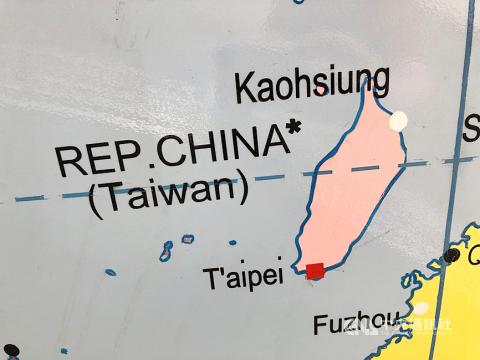The Ministry of Foreign Affairs yesterday applauded the London School of Economics and Political Science (LSE) for not changing the color of Taiwan on a sculpture of the globe on its campus, saying the decision tallies with the cross-strait “status quo.”
The university on March 26 unveiled the sculpture, titled The World Turned Upside Down by the Turner Prize-winning artist Mark Wallinger, outside its Saw Swee Hock Student Centre.
It is a political globe, 4m in diameter, with nation states and borders outlined, but with “the revolutionary twist of being inverted,” the university’s Web site says.

Photo: CNA
On the sculpture, Taiwan is labeled “Rep. China* (Taiwan)” and colored pink, while China is labeled “China (People’s Republic)” and colored yellow.
The representation irked the university’s Chinese students, who demanded that Taiwan and China be painted the same color, while Taiwanese students submitted a petition with more than 10,000 signatures urging the school to keep the original design.
The school in April said it was consulting experts and mulling changes to the sculpture, but later decided to retain the original design and erected a placard next to it.
“LSE is a place where people with different perspectives engage in respectful debate about major issues for the world,” the placard reads.
“The designated borders, colours, and place names do not imply endorsement by LSE concerning the legal status of any territory or borders,” it says. “There are many disputed borders and the artist has indicated some of these with an asterisk.”
An asterisk was placed beside Taiwan, as well as Palestine, which is entangled in territorial disputes with Israel.
The decision not only respects the artist’s original vision, but also reflects the “status quo” across the Taiwan Strait, the ministry said in a statement.
Many British lawmakers, academics and opinion leaders over the past few months have been calling on the school to maintain the artwork as is, the ministry said, expressing gratitude for their attention to the incident.
Minister of Foreign Affairs Joseph Wu (吳釗燮) on April 5 penned an open letter to LSE director Minouche Shafik, calling on the school not to change the artistic design due to Beijing’s pressure.
LSE has inspired many young Taiwanese in the pursuit of academic excellence and President Tsai Ing-wen (蔡英文) has always been proud of her LSE experience, Wu wrote.
Additional reporting by CNA

CHAOS: Iranians took to the streets playing celebratory music after reports of Khamenei’s death on Saturday, while mourners also gathered in Tehran yesterday Iranian Supreme Leader Ayatollah Ali Khamenei was killed in a major attack on Iran launched by Israel and the US, throwing the future of the Islamic republic into doubt and raising the risk of regional instability. Iranian state television and the state-run IRNA news agency announced the 86-year-old’s death early yesterday. US President Donald Trump said it gave Iranians their “greatest chance” to “take back” their country. The announcements came after a joint US and Israeli aerial bombardment that targeted Iranian military and governmental sites. Trump said the “heavy and pinpoint bombing” would continue through the week or as long

TRUST: The KMT said it respected the US’ timing and considerations, and hoped it would continue to honor its commitments to helping Taiwan bolster its defenses and deterrence US President Donald Trump is delaying a multibillion-dollar arms sale to Taiwan to ensure his visit to Beijing is successful, a New York Times report said. The weapons sales package has stalled in the US Department of State, the report said, citing US officials it did not identify. The White House has told agencies not to push forward ahead of Trump’s meeting with Chinese President Xi Jinping (習近平), it said. The two last month held a phone call to discuss trade and geopolitical flashpoints ahead of the summit. Xi raised the Taiwan issue and urged the US to handle arms sales to

State-run CPC Corp, Taiwan (CPC, 台灣中油) yesterday said that it had confirmed on Saturday night with its liquefied natural gas (LNG) and crude oil suppliers that shipments are proceeding as scheduled and that domestic supplies remain unaffected. The CPC yesterday announced the gasoline and diesel prices will rise by NT$0.2 and NT$0.4 per liter, respectively, starting Monday, citing Middle East tensions and blizzards in the eastern United States. CPC also iterated it has been reducing the proportion of crude oil imports from the Middle East and diversifying its supply sources in the past few years in response to geopolitical risks, expanding

Pro-democracy media tycoon Jimmy Lai’s (黎智英) fraud conviction and prison sentence were yesterday overturned by a Hong Kong court, in a surprise legal decision that comes soon after Lai was jailed for 20 years on a separate national security charge. Judges Jeremy Poon (潘兆初), Anthea Pang (彭寶琴) and Derek Pang (彭偉昌) said in the judgement that they allowed the appeal from Lai, and another defendant in the case, to proceed, as a lower court judge had “erred.” “The Court of Appeal gave them leave to appeal against their conviction, allowed their appeals, quashed the convictions and set aside the sentences,” the judges